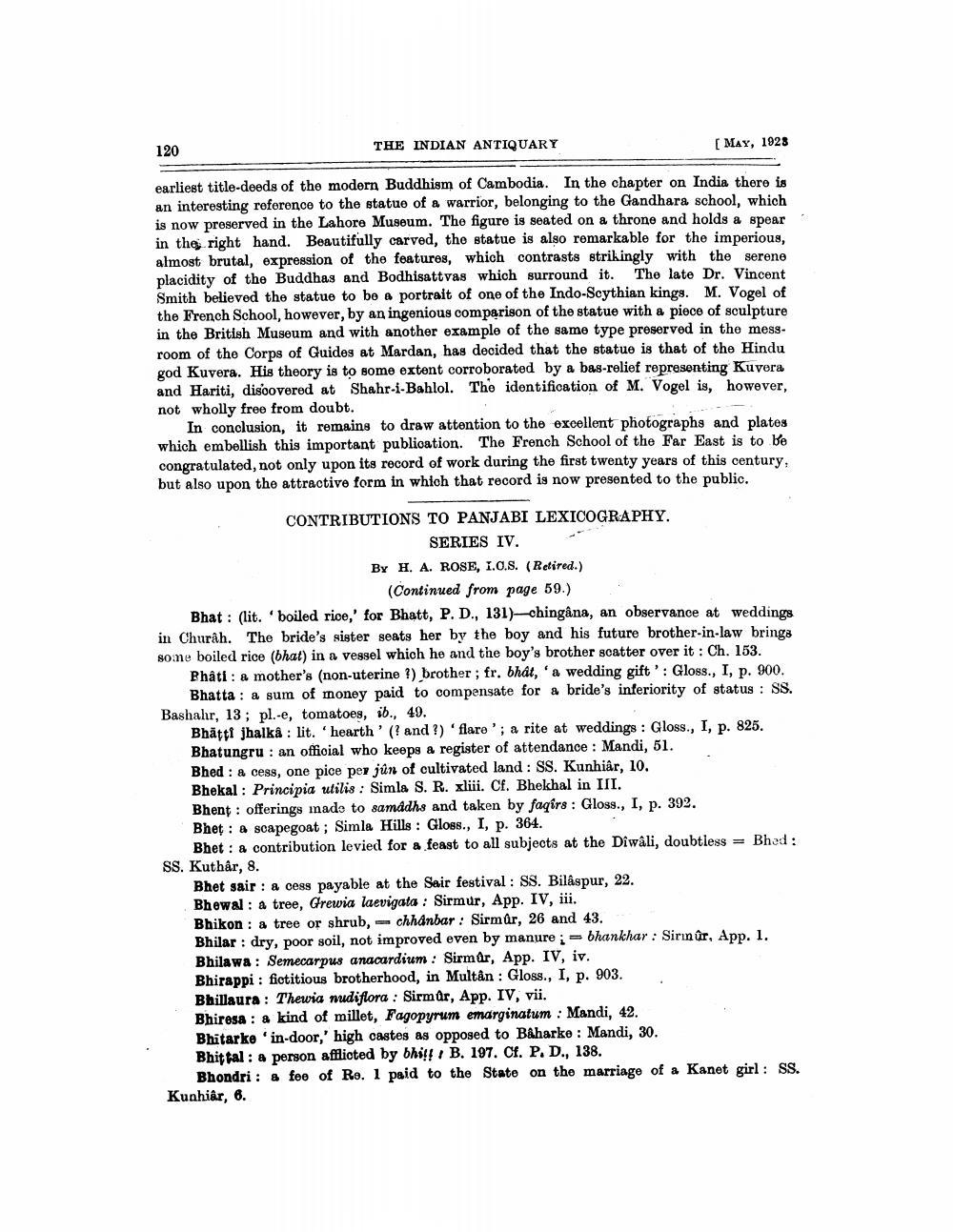________________
120
THE INDIAN ANTIQUARY
[ May, 1928
earliest title-deeds of the modern Buddhism of Cambodia. In the chapter on India there is an interesting reference to the statue of & warrior, belonging to the Gandhara school, which is now preserved in the Lahore Museum. The figure is seated on a throne and holds a spear in the right hand. Beautifully carved, the statue is also remarkable for the imperious, almost brutal, expression of the features, which contrasts strikingly with the serene placidity of the Buddhas and Bodhisattvas which surround it. The late Dr. Vincent Smith believed the statue to be a portrait of one of the Indo-Scythian kings. M. Vogel of the French School, however, by an ingenious comparison of the statue with a piece of sculpture in the British Museum and with another example of the same type preserved in the messroom of the Corps of Guideg at Mardan, has decided that the statue is that of the Hindu god Kuvera. His theory is to some extent corroborated by a bas-relief representing Kuvera and Hariti, disoovered at Shahr-i-Bahlol. The identification of M. Vogel is, however, not wholly free from doubt.
In conclusion, it remains to draw attention to the excellent photographs and plates which embellish this important publioation. The French School of the Far East is to be congratulated, not only upon its record of work during the first twenty years of this century, but also upon the attractive form in which that record is now presented to the public.
CONTRIBUTIONS TO PANJABI LEXICOGRAPHY.
SERIES IV. By H. A. ROSE, 1.C.S. (Retired.)
(Continued from page 59.) Bhat: (lit. boiled rice,' for Bhatt, P. D., 131)—chingâna, an observance at weddings in Churâh. The bride's sister seats her by the boy and his future brother-in-law brings so me boiled rice (what) in a vessel which he and the boy's brother scatter over it : Ch. 153.
Phâti: a mother's (non-uterine ?) brother; fr. bhát, a wedding gift': Gloss., I, p. 900.
Bhatta: a sum of money paid to compensate for a bride's inferiority of status : SS. Bashahr, 13; pl.-e, tomatoes, ib., 49.
Bhāti jhalka : lit. 'hearth' (? and ?) 'flare'; a rite at weddings : Gloss., I, p. 825. Bhatungru : an official who keeps a register of attendance : Mandi, 51. Bhed : a cess, one pice per jún of cultivated land : SS. Kunhiâr, 10. Bhekal : Principia utilis : Simla S. R. xliii. Cf. Bhekhal in III. Bhent : offerings mado to samadhs and taken by faqirs : Gloss., I, p. 392. Bhet: a scapegoat ; Simla Hills : Gloss., I, p. 364.
Bhet: a contribution levied for a feast to all subjects at the Diwali, doubtless = Bhed: SS. Kuthår, 8.
Bhet sair: a cess payable at the Sair festival: SS. Bilaspur, 22. Bhewal: a tree, Grewia laevigata : Sirmur, App. IV, iii. Bhikon : a tree or shrub, chhanbar: Sirmar, 26 and 43. Bhilar : dry, poor soil, not improved even by manure : bhankhar : Sirin ûr, App. I. Bhilawa : Semecarpus anacardium : Sirmar, App. IV, iv. Bhirappi : fictitious brotherhood, in Multân : Gloss., I, p. 903. Bhillaura: Thewia nudiflora : Sirmur, App. IV, vii. Bhiresa : a kind of millet, Fagopyrum emarginatum : Mandi, 42. Bhitarke 'in-door,' high castes as opposed to BAharke: Mandi, 30. Bhittal : a person afflicted by bhi!! B. 197. Cf. P. D., 138.
Bhondri: & fee of Ro. 1 paid to the State on the marriage of a Kanet girl: SS. Kunhiên, 6.




